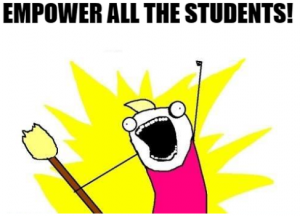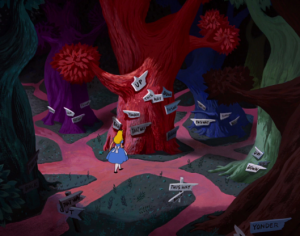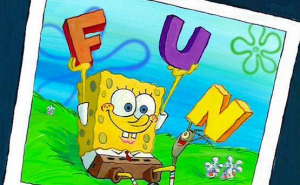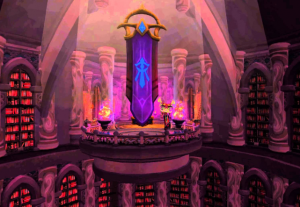The coolest aspect of this semester’s sequence for me is that it’s got me rethinking everything I’ve ever considered regarding online course design. Teaching mostly pre-transfer classes has the benefit and consequence of forcing me to slow down; a lot of concepts academics take for granted I’ve had to open up, explore, and by deconstructing, reconstruct with my students. The intention is that building these concrete foundations will bolster them when they’re later presented with the sophisticated prompts 100 and 201/202 administer; my goal is for them to meet these at times abstruse assignments with conviction and confidence. As a result, my focus in the past has been to alleviate any confusion by going slowly and presenting linearly.
Now, however, I’ve rethought what I’d like to do. I’m revved, jazzed, and ready to try out new ideas! Without further ado, here are the various aspects of my dream course:
Colors, images, videos, sound bytes—bring on all the creativity! I want my course to be fun. When a student logs in, I want their face to light up with joy as a small child’s does on Christmas morning! Alright, perhaps that would be too much to hope for regarding an OWCourse, but a girl can dream. As a gamer, I love beautiful, immersive video games that transport me into their worlds. Cutscenes, interesting tutorials, and opening quests all help me to understand the new environment I’m entering into—more on the video game aspect later. I’d like to create an immersive online environment for my students, and this means incorporating videos, background sound clips and music, different background colors on each page, and different images reflecting the topics. Using multimedia to create diverse, dynamic, and fun assignments, pages, and links is my goal here; they’ll see recordings of me speaking and presenting, but also recordings from movies, music videos, the local community, recorded presentations, and perhaps even themselves! I love the dramatic, so I’d like to make my video recordings where I explain what they’re doing for an assignment or sequence themed—perhaps I’ll dress as a Greek philosopher in one, a Gaulish chieftain in another, etc. Yes, this would be silly, but that’s the point. (For more info on why I’m so focused on fun/silly teaching, please read “The Neuroscience of Joyful Education” which can be found here.) Small movie clips, AV meetings with each student individually and in small groups, lots of fun and colorful images, sound effects, and music will all bring my OWcourse to life to create a lively and captivating learning environment.

Dynamic and changing—allow my students to co-create the course as we go! I really admire that many of you spoke to the idea of giving students as much agency as possible. This also harkens back to our fantastic discussion on equity. My online course would hold four “feedback forums” where we meet synchronously as a class via a text and voice chatroom. Perhaps Zoom, even, although I’m hesitant to use video chats for large groups. Regardless, my students would provide me with ideas on what they’d like to do during the next unit and suggest lessons, concepts, and exercises. I’m no Finkel or Faigley (those well-esteemed expressivists!), so the class cannot be purely “Design Your Own Course” for each student—there will inevitably be competing ideas—but I’d like to allow them to have a certain amount of say in what we do. I suppose these forums can be seen as diplomatic negotiations. At the very beginning of the course, I’d like to have one major forum where we discuss all the concepts they’ve ever wanted to learn from an English course; from here, I’d try to fit them into the rest of what we do. Empower all the students!

Multiple access points and multiple pathways! This is one of my biggest “rethink” moments of this sequence. I think my reliance on linear models is due to my fear of losing students, but I’d like to challenge that assumption and try out a more dimensional online course design. Therefore, my course would contain a multitude of different ways for students to access content, and the sequences themselves will give my students the ability to choose their own order of completion. I’ll be honest, this idea scares me a bit—I’m so entrenched in scaffolding that this suggestion goes against the very nature of what I perceive teaching composition to be. But nothing ventured nothing gained!

Always a face, never an IP! Curry mentioned a word for my eCafés that I like: piazza-style. I love this, thank you! I want to hold small group and class-wide piazza discussions. These would include my twice-a-week three-hour-long eCafés where students can log into a chat room with me and ask any questions they might have. But I’d like to hold Zoom meetings with small groups—during collaborative projects and just to foster peer and student-to-teacher rapport—as well as a multitude of “roll question discussion posts”. The Zoom meetings would be places for students to discuss work with each other and collaborate on group projects. The Roll Question Discussion Posts would be once-a-week “fun” posts with silly questions for them to respond to—check-in check-out points. The goal is to create familiarity, understanding, affinity, and acquaintance. I want my students to without a doubt know that I care about each of them individually and that I know who they are. I want them to also know who I am. Additionally, I would like them to really get to know each other, and for them to form and build friendships with their fellow classmates.

Gamification—more exploration, more open-minds! Bentley, you ought to either do a professional development session on this or teach a whole course—your ideas on incorporating games are awesome! Anyway, kudos aside, I agree with Mary Poppins: “in every job that must be done, there is an element of fun—you find the fun, and snap! The job’s a game!” If I can make my OWcourse fun and incorporate games, my students might not only learn better, but look forward to learning—the holy grail of teaching concepts. I’d like to incorporate something like Ready Player One: an MMO-style class setting where students log in, build their own avatars, and complete class “quests” for experience and rewards. These quests would be three-dimensional fun exercises that explore the readings, build their papers, etc. Just like an MMO, with more experience, the more they level up. The more they level up and the more gold they get for completing quests, the cooler the gear/clothes/etc. they are able to procure. There’s a reason video games are so often addictive! Perhaps we could even incorporate area-style PvP matches with rhetorical devices and cool-moves papers and readings make! All of these fun elements I want to replicate; my aim would be to use that same level-up process in my OWcourse.

…So, these five points don’t begin to cover everything I plan on incorporating, but they’re some of the imagings I’ve had. This is a very grandiose dream, but I would absolutely love to incorporate as much of it as possible. At the end of the day, while I want my students to receive clear feedback, foster collaboration, ensure equity on all levels, and have a reliable course design, I’d also dearly love to make them smile.
Thank you to all of you for a fantastic sequence! I’ve gained so much from your insights, ideas, and feedback, and look forward to trying out these many suggestions in future OWcourses!
Thank you to Curry and Jim for your wonderful leadership, skill-sharing, and administration! I’m so grateful to have been a part of this experience, and I hope we can have even more teaching-online discussions in the future!
My posts:
Channeling Pink Floyd (Feedback and Assessment)
Channeling The Beatles (Collaboration and Group Work)
Channeling YES (Equity, Accessibility, and Universal Design)
Channeling Elton John (Course Design and Organization)
And this one, channeling Chicago (Dream course)
